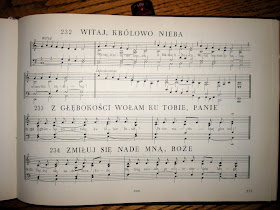"Hail, Queen of Heaven" is an old Polish hymn, traditionally sung at the graveside. The singers ask Mary, Queen of Heaven, to intercede with her Son on behalf of the deceased, to hasten his admission to Heaven. The simple melody sounds exactly like the voice and the tones of a child, a well-behaved and serious, loving and beloved child, asking his mother for favor and blessing for an important and worthy purpose. The lyric conveys that request in simple, reverent, serious, yet confident phrases.
John Zdrojewski, our JFZ, gave a moving eulogy at the funeral of his brother Eugene, our EJZ, and one thing he mentioned was "Witaj Królowo Nieba." This hymn the Zdrojewski sons, each in his turn, sang at funerals when they were altar boys at St. Luke's, wearing their robes, swinging the censer, accompanying the priest, and moving those present to tears.
This is Eugene's Polish hymnal, which is all new to me. John has one, too, he tells me; everybody at St. Luke's had one.
"śpiewać" is "to sing;" (similar to "spiel" and calling to mind our phrase "Don't give me that song and dance!")
"śpiewnik" is "songbook;"
"śpiewnik koscielny" is "songbook for church," hence "hymnal;"
"wielbij duszo moja pana śpiewnik koscielny" can be rendered as a title and subtitle:
"My Soul Glorifies my Lord - Sacred Songbook."
The volume format seems more intended for an organist than a chorister, and not too many lyrics are given. So choristers would perhaps use this to learn a hymn for performance from memory.
"Nihil obstat" proclaims the
censor liborum: "Nothing stands in the way." No doctrinal error stands in the way of use of this work by the faithful.
"Imprimatur," third-person singular present passive subjunctive of imprimo, print.
Hence, "It may be printed."
"Pieśni za Dusze Zmarłych" - "Songs for the Souls of the Dead."
You see it just gives four bars, for which I do not know the proper names. But they are an introductory phrase, the melody line with little lyric-phrasing marks, a long "Amen" phrase, and a final chord.
Click to enlarge.
Witaj Królowo nieba i Matko litości,
Witaj nadziejo nasza, w smutku i żałości!
K'Tobie wygnańcy Ewy wołamy, synowie,
K'Tobie wzdychamy płacząc z padołu, więźniowie.
Orędowniczko nasza, racz swe litościwe,
Oczy spuścić na nasze serca żałośliwe.
I owoc błogosławion żywota Twojego
Racz pokazać po zejściu z świata mizernego.
O łaskawa, pobożna, o święta Maryja,
Niechaj będą zbawieni wszyscy grzesznicy i ja.
O Jezu, niech po śmierci Ciebie oglądamy,
O Maryjo, uproś nam, czego pożądamy.
Uproś nam żywot wieczny, grzechów odpuszczenie,
A przy śmierci skon lekki i duszy zbawienie.
O Jezu, Jezu, Jezu, Jezu mój kochany,
Jezu wielkiej dobroci nigdy nie przebrany.
Źródło: Śpiewnik Stulecia Orchard Lake
This translation is offered here, where you can listen to a priest singing this hymn on an All Soul's Day at St. Casimir's Oratory in Buffalo.
Hail our Queen of Heaven and Mother of Mercy,
Hail our hope in sorrow and all adversity.
We, the banished sons of Eve, are calling out to Thee,
Sighing and weeping in this prison valley.
O our Mediatrix, direct Thy gaze so merciful
Upon our hearts unworthy, ever so pitiful.
Deign to show us Thy womb’s fruit
Glorious and most blessed,
When it’s time we leave this world
Miserable and wretched.
Hail Mary full of grace, piety and devotion
Let all sinners, me amongst them, obtain our salvation.
Julie



















